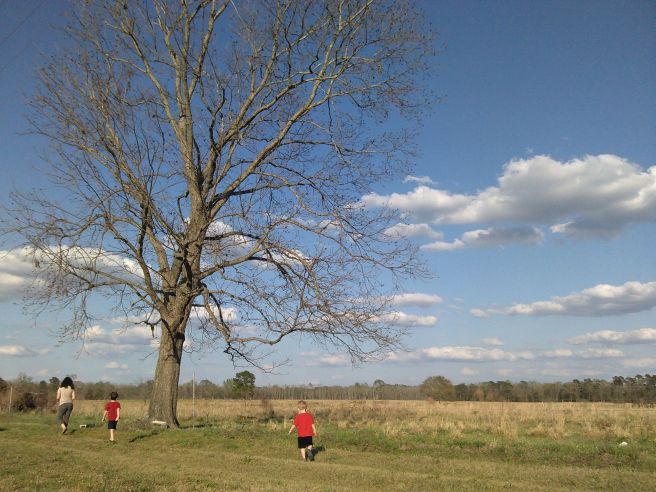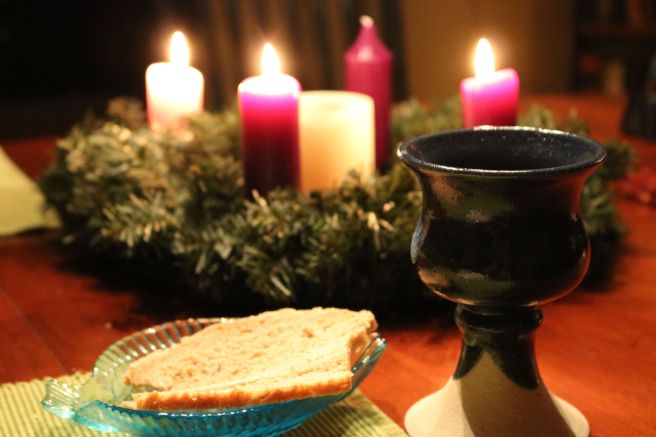I’ve spent some time reflecting on what has kept our family grounded during the past few months. After all, it’s been an eventful end to the summer and beginning to fall:
We survived a hurricane… we found out we’re expecting a new baby… we celebrated our tenth anniversary… we learned that our baby might have a heart condition that could require surgery immediately after birth… a dear friend and mentor has been in the ICU for nearly two weeks… I took a bittersweet trip to my college campus to reminisce with friends about a life gone too soon… not to mention the daily marathon of getting everyone up, getting everyone fed, getting everyone out the door, etc. etc.
Every time Courtney and I think life might finally start to slow down a bit, it seems God makes sure our seat belts are fastened tight.
What’s kept us grounded through it all? What’s been our center, where are our roots?
In large part, it’s been these traditions of ours, the ones I’ve been attempting to catalogue in this blog. Things like:
- weekly communion and prayer at home with the kids
- our church community’s recent focus on and renewed commitment to fasting
- celebrating Sukkot
- daily prayer and daily Bible reading (even if we’re exhausted and can only muster the strength to read one Psalm before whispering a “thank-you-God-now-please-help-us” prayer)
- recent reminders to “be not afraid,” one of the most repeated commands in scripture, and which is etched on the inside of our wedding rings
This blog is subtitled “one family’s slow-paced stroll through old traditions, new routines, and a home-grown liturgy.” Indeed, I’ve found it’s this slow-paced stroll that provides the antidote to times that feel exceedingly hurried and harried.
So what is it about roots that keeps us, well, rooted?
Recently we spent a few days in St. Petersburg, FL, to celebrate our anniversary. Down by the bay, there’s a park where two massive banyan trees grow.
The banyan is such a fascinating thing: mighty branches that jut out, each one with dozens of wispy willow-like branches that dangle down and bounce in the breeze. But when these wisps meet the ground, they turn into roots, growing and gaining strength. And when these wisps take root, it’s enough to give one tree the appearance of several, turning each tree into its own forest.

Each one has passageways and cubbyholes and tunnels and trails and tangles around every corner… perfect for exploring. Our boys spent about an hour here, trying to chart every possible path in and through the trees.

Something so little as a wisp can, with time, take hold and make all the difference when, say, a Category 1 hurricane sweeps through. Even the littlest roots can make a thing more grounded over time.

Help us, Lord, to make sure we’re putting down the right roots, even if they just feel like little wisps most of the time.
This is our prayer for our family. Not just for here and now, to help us through these hectic days. But also for the future, for 10, 20, or 50 years from now, when our boys are all grown up and out of the house and away from the routines that we’re weaving together under this particular roof. What will their roots be at that time? Where will they find their groundedness? These wisps that don’t look like much– which ones will grow into the roots that will help them survive their own hurricanes?
We’ve all been told not to sweat the small stuff. But God is in the small stuff, right? And it’s the small stuff that matters. These wisps that we try to bring into our life together– the little routines of praying together or sharing the communion meal together or reciting a psalm to one another every Saturday morning– these are the small things that might one day form the foundation of our boys’ lives when they are men. Or at least these small things will help them as they build their own homes upon the rock (Matthew 7:24).
So to answer the earlier question, this is what keeps me and Courtney going and this is what keeps us grounded. Because when everything else feels like it’s been uprooted (literally and figuratively) and like it’s coming at us so fast we can barely blink before it’s already past and the next thing is barreling towards us, it’s the littlest roots that make the biggest difference.


 Nothing fancy, this matzah and Manischewitz. But this weekly tradition of ours has become almost hallowed in our home. Tonight as I was cleaning up I prayed, “Lord, I want to do this better.” And I sensed the Lord’s reply: “This will help.” Our communion time will never be perfect, but we don’t bring perfection to the elements. Over time, they bring perfection to us because they help us allow more and more of the Lord’s presence into our home, our lives, our hearts.
Nothing fancy, this matzah and Manischewitz. But this weekly tradition of ours has become almost hallowed in our home. Tonight as I was cleaning up I prayed, “Lord, I want to do this better.” And I sensed the Lord’s reply: “This will help.” Our communion time will never be perfect, but we don’t bring perfection to the elements. Over time, they bring perfection to us because they help us allow more and more of the Lord’s presence into our home, our lives, our hearts.
